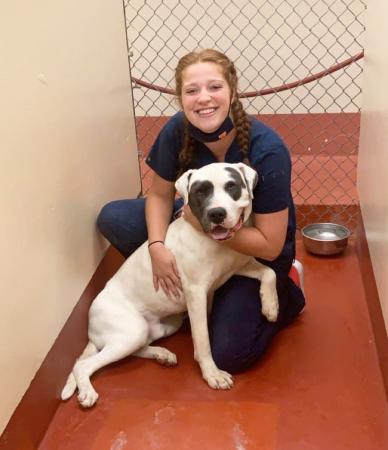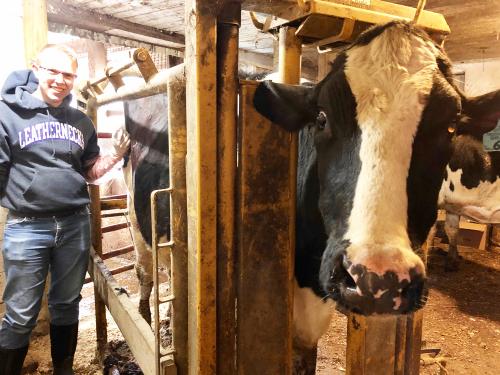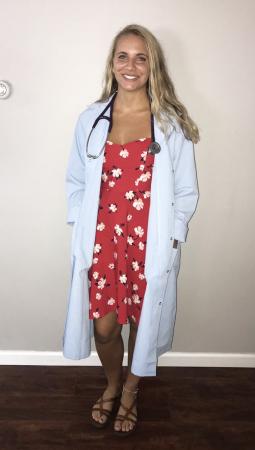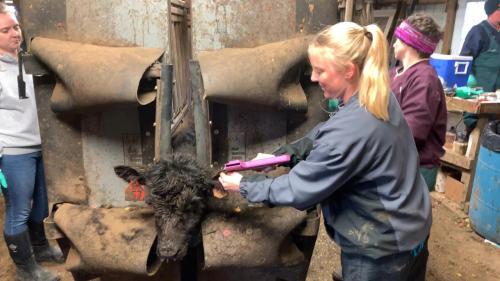University News
WIU Offers Foundational Education Needed to Pursue Career in Veterinary Medicine
March 30, 2021
MACOMB, IL – The Western Illinois University School of Agriculture offers a pre-professional program designed to meet the requirements for admission to a school of veterinary medicine after graduation. Numerous University alumni are currently enrolled in veterinary school, building on the educational foundation they received from WIU.
Due to intense competition for admission to schools of veterinary medicine, most students first complete a four-year bachelor's degree program prior to admission. Those students considering a career in veterinary medicine should have a good foundation in biological sciences and chemistry, including biochemistry, as the minimum knowledge base for success in the curriculum.
In addition, a course or courses concerning livestock production and animal ethology are highly desirable. Those seeking a career in veterinary medicine, related to agriculture, should consider additional background in nutrition, livestock management and the economics of production by working toward a degree in agriculture prior to admission to veterinary school. Students may also pursue other major fields of study.
The pre-veterinary medicine program at Western has provided a solid foundation for numerous students and alumni who want to further their education. A common thread between these students is the way they decided to pursue careers as veterinarians.
For 2020 graduate Taylor Carey, originally from New Boston, IL, she has known since she was a young child what her future career goals were.
"Once in high school, when I was seriously considering my future, vet med was not on my list because I was afraid I wouldn't be able to do it," she said. "It was not until the first semester at WIU where I realized I was capable of becoming a veterinarian and actually began to pursue it."
For 2019 graduate Luke Daniels, originally from Strasburg, IL, his path was a bit different.
"I made the decision to pursue a degree in veterinary medicine after graduating from Lake Land College with an associate degree in agriculture production and management," he said. "This is far from the normal path of pre-vet students, but at the time I was not planning on continuing my education at a four-year university. My plan was to enter the workforce and find a job that was related to the livestock industry, more specifically the cattle industry."
Daniels said he had always liked the idea of becoming a veterinarian, but felt that it was out of reach for him.
"After my two years at Lake Land College, I decided that if I did not set this as a goal for myself and work toward achieving it, I would always regret it," he added. "That is where Western came in."
For Ryan Ackman, a 2019 WIU graduate originally from Galesburg, IL, deciding to become a veterinarian was a long time coming.
"I've always known that I wanted to work with animals," she said. "When I was growing up, my family bred Australian shepherds, and we fostered kittens, so I've always been around, and taken care of, animals. However, my final decision to become a veterinarian wasn't made until high school, when I realized my strong interest in medicine."
A similar story is shared by 2019 graduate Cassidy Tarter, originally from Canton, IL.
"I've known since I was little that I wanted to be a veterinarian," she said. "I know it sounds very cliché, however, my love for animals, and helping them, started with my show cattle around the age of 3, and blossomed from there."
For many veterinary and agricultural students, one of the biggest factors contributing to their decision in becoming a veterinarian was the resources WIU made available to them.
"I was enrolled in an intro to animal science class with Dr. Mark Hoge my first semester at WIU," said Carey. "We had a substantial amount of hands-on experience in this class that really pushed this to happen. Our first lab involved giving iron shots to piglets, as well as ear-notching them for identification purposes. I was so nervous to participate, but once I did, I realized how much I loved it and immediately contacted my advisor afterward to see what I needed to do to pursue the pre-veterinary track."
For Daniels, discovering WIU's agriculture department was the biggest step in making the decision to become a veterinarian.
"The entire experience I had at WIU was extremely helpful as I started my journey," he said. "The science classes that were offered helped to get me thinking in a different way than what I was used to. In a way, I think that is one of the reasons they require those courses to get in. They changed the way I looked at most things and encouraged a deeper, more professional way of thinking. The ag classes, and the ag department, were the reason I came to WIU. I had heard that the ag department at WIU was the best around, and I have to say I agree."
For Ackman, a closer relationship with one of the many talented advisors at WIU was what made all the difference.
"My advisor, Ember Keithley, was a huge help. She helped me to align the classes that I chose at WIU with the prerequisites for the veterinary schools that I applied to," said Ackman. "Also, being in the Honors College gave me many opportunities to add to my vet school applications, such as extra-curricular activities and taking interesting classes that I otherwise would not have had access to. I also joined clubs that allowed me to indulge my interest in animals. Additionally, many classes such as genetics, animal breeding, and various biology classes enhanced my interest in animal science and gave me knowledge that I still utilize in some of my classes at vet school. Finally, I found the professional development classes that I took through the agriculture department to be extremely helpful in preparing for my vet school interview."
Tarter said WIU's School of Agriculture helped guide her path through the variety of classes that were offered.
"The animal science classes taught by Dr. Trennepohl were especially helpful and gave me a better grasp of the knowledge we are being taught while here," she said. "It gave me a leg up to know some of the information prior to learning it recently in the heavy course load we have here at school. The relationships I developed with the teachers, and networking opportunities also helped. WIU Farm Manager Jay Pittman also gave me the confidence that I could succeed by allowing me to help on the farm and gain experience that I previously hadn't had access to."
The stories of these students and their successes are just a few examples of how WIU's agricultural department offers a chance at becoming a part of something greater.
"We are extremely proud of our graduates who pursue being a doctor of veterinary medicine," said School of Agriculture Director Andy Baker. " It takes a special type of student, with enough drive and commitment, to endure the rigor of veterinary medicine school. Their passion for animals is usually the catalyst, but it is the mentoring and educational experiences that finishes the race for these students. It is our caring, committed faculty that encourage these students to pursue their life-long dreams of being a doctor of veterinary medicine. We are thrilled to have had the opportunity to work with all of these exceptional students."
For more information about the Agriculture and Pre-Veterinary program, visit wiu.edu/cbt/agriculture/minors_professional.php. Students who wish to pursue studies in pre-veterinary medicine can contact Keithley, the academic advisor for the WIU School of Agriculture, at EL-Keithley@wiu.edu.
Posted By: Ethan Hager (wiunews@wiu.edu)
Office of University Communications & Marketing





Connect with us: